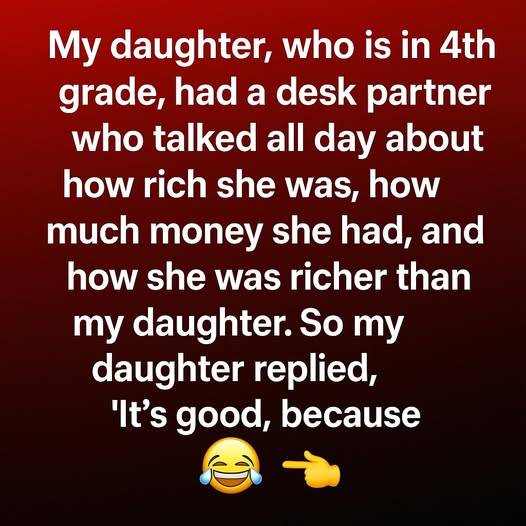My daughter, a bright and cheerful 4th grader with an infectious laugh and an insatiable curiosity, loved going to school every single day. She enjoyed the small routines, like lining up with her classmates, hearing the morning announcements, and the way her teacher made even the most complicated subjects seem fun. She loved learning, laughing with friends, trading small secrets and stories about her adventures at recess, and the way every day seemed to bring something new and exciting. School was her little world of discovery, and she thrived in it.
One ordinary Tuesday, she was paired with a new desk partner, a girl she hadn’t met before. At first, they exchanged shy smiles and awkward hellos, but it quickly became clear that her new partner had a habit of talking about her wealth. From the first few minutes, the girl spoke proudly about her big house, the fancy toys she had, and all the things her family owned. She described in detail the vacations they went on, the gadgets she had in her room, and the clothes she wore that were far more luxurious than most of her classmates. My daughter listened quietly, curious but not bothered, processing the information with the calm attentiveness that made her so thoughtful for her age.
As the morning turned into afternoon, the conversation never changed. The girl continued to emphasize how much money her family had, how lucky she was, and how much more she possessed than anyone else in the room. It wasn’t boastfulness in a cruel way—she genuinely seemed proud—but it was constant. My daughter began to feel a little overwhelmed, not by jealousy or resentment, but by the sheer weight the girl placed on material things. She looked around the classroom with new eyes, noticing her favorite crayons neatly arranged in a cup, her notebook filled with ideas and doodles, the colorful posters on the wall, and her smiling teacher patiently guiding the students through their lessons. She realized that her happiness didn’t come from having more things, but from appreciating the little moments that made her day special.
By mid-afternoon, when the girl once again mentioned how much richer she was compared to everyone else, my daughter took a deep breath and smiled gently. She chose her words with care, speaking calmly and thoughtfully, as if she had rehearsed this lesson in her mind many times before. “It’s good,” she said softly, “because that means you can help others who need it.” Her words were simple, yet filled with a depth of understanding far beyond her years. The other girl froze for a moment, blinking in surprise. She hadn’t expected such a response, and for the first time that day, she found herself without words, uncertain how to continue the conversation.
The teacher, who had been nearby, overheard the exchange and couldn’t help but smile proudly. She recognized the valuable lesson being shared and knew this small moment could leave a lasting impression. My daughter learned that kindness, empathy, and the ability to think beyond oneself carry more value than any amount of money. She understood that true wealth is measured not by what you have, but by how you make others feel and the ways you choose to give. Meanwhile, the girl who had spoken so proudly about her possessions began to reflect quietly, realizing for the first time that showing off material things didn’t bring the fulfillment she imagined. She started to understand that the truest richness comes from how you treat people, not what you own.
By the end of the day, a seed of empathy had been planted in both girls. My daughter’s gentle wisdom had offered a small glimpse of a world where generosity and kindness mattered more than status or wealth. And slowly, the other girl began to see friendship, not competition, in a new, brighter way. Over the following weeks, they became friends, sharing stories, helping each other with classwork, and discovering that happiness and connection are far more meaningful than any toy or expensive item. In that small classroom, a simple act of wisdom had created ripples of understanding, shaping not only their friendship but the way they would view the world for years to come.
